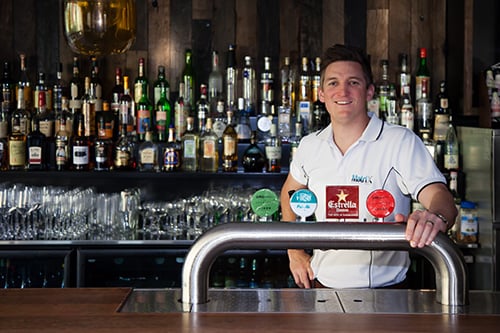

On January 14, the lockout laws around Sydney CBD entertainment precinct were lifted, meaning the area, except the still ‘locked-out’ Kings Cross, will revert back to the liquor laws that apply to the rest of the city. Patrons can enter venues after the once 1:30am lockout time, drinks can be served with the correct licence after 3am and shots and doubles can be poured once again.
The laws, introduced in 2014 in response to two fatal attacks in the area, have been controversial. Critics claim that revellers simply migrated south, towards Newtown, taking potential violence along with them – leaving the CBD’s once lively nightlife to suffocate. After almost six years however, the NSW Government have lifted the lockout laws to the delight of locals and tourists alike, but to the chagrin of nearby medical professionals and emergency service staff. But with the changing of the law, will insurance underwriting in affected premises in the area change with it?
Oliver Whittingham (pictured), director of Matrix Insurance Group, explained to Insurance Business the faceted nature of hospitality insurance, that illustrates the potential of insurance changing for once ‘locked-out’ venues in Sydney.
“Hospitality insurance is a varied field – you have everything from cafes and caterers all the way up to bars and nightclubs,” said Whittingham. “It’s never too much of an issue getting cover for restaurants and cafes – where the issues are regarding insurance is within the late-night leisure zone.”
When underwriting an insurance risk for a bar or nightclub, a detailed list of attributes are looked at. The opening hours of the venue, a history of abiding to relevant laws, staff being correctly trained in the Responsible Service of Alcohol (RSA), proximity to potential risks and reputable security being present are just a number of important factors that affect insurance in this sphere.
“Underwriters will look at it on a case-by-case basis,” Whittingham told Insurance Business. “They will even look at the square meterage of the dance floor, for example.”
Whittingham explained that underwriters for hospitality insurance will go as far as checking out the venue on different forms of social media, to ensure the respectable nature of the establishment.
Mark Polglase, chief underwriting officer of the SME divistion at Blue Zebra Insurance, told Insurance Business that traditional questions about the premises will first be asked, before a broader picture of the venue can be gained.
“The more information you can gain from these questions, the more confident you are in then providing a quote,” he said.
With lockout laws now lifted, can we expect to see a sea-change in how insurance is underwritten for affected businesses and venues within the area? In the most basic sense, not dramatically – but such is the layered nature of hospitality insurance and the conflicting consequences of the lockout laws themselves; it is hard to provide a definitive answer.
Even with the lockout laws changing, the attributes of the businesses and venues in question will likely stay the same – especially for late night restaurants and bars. Capacity of the venue, the provision of contracted security, the presence of CCTV and the proper training of staff will all remain the same; all of which is looked at when underwriting hospitality insurance. More people will be likely to enter venues at later times and increased levels of alcohol, at faster rates, is again permitted – but venues should have contingency plans in place to ensure their normal operation is comparatively unaffected.
Polglase explained to Insurance Business that with the area having been deemed improved enough in regard to the responsible service and consumption of alcohol to lift the laws, we can assume that the venues would have been doing something right – which would have a positive effect on insurance underwriting.
“Clearly there has been a reverse and there is now a confidence there that the pattern or the cycle of activity has been broken,” said Polglase. “I guess time will tell if the bar has been raised, pardon the pun, in terms of making sure that these venues and the environments around them are now much safer.”
Improved safety in Sydney’s CBD entertainment precinct should correspond with more favourable insurance underwriting, but time will tell if the lifting of the lockout laws will mark a continued improvement in safety or a return to a drunk violence - both of which have a significant impact on how insurance is underwritten for hospitality businesses in the area.
